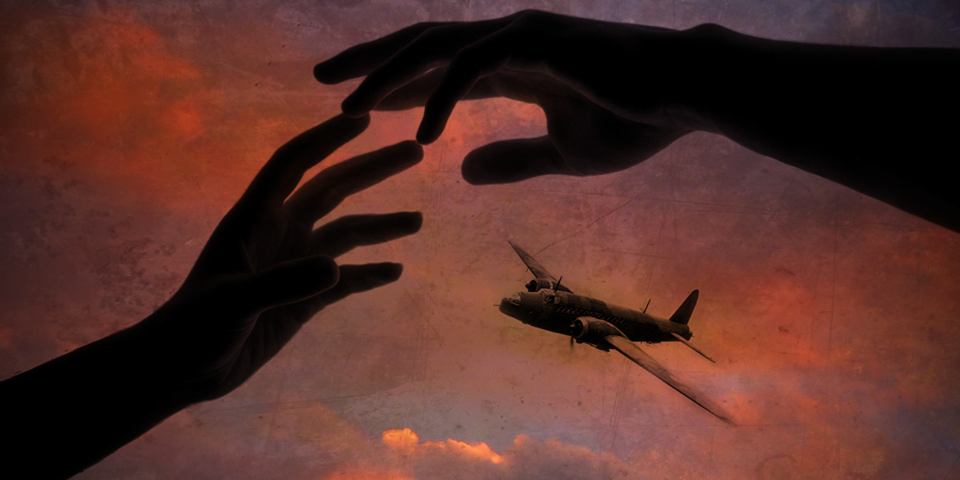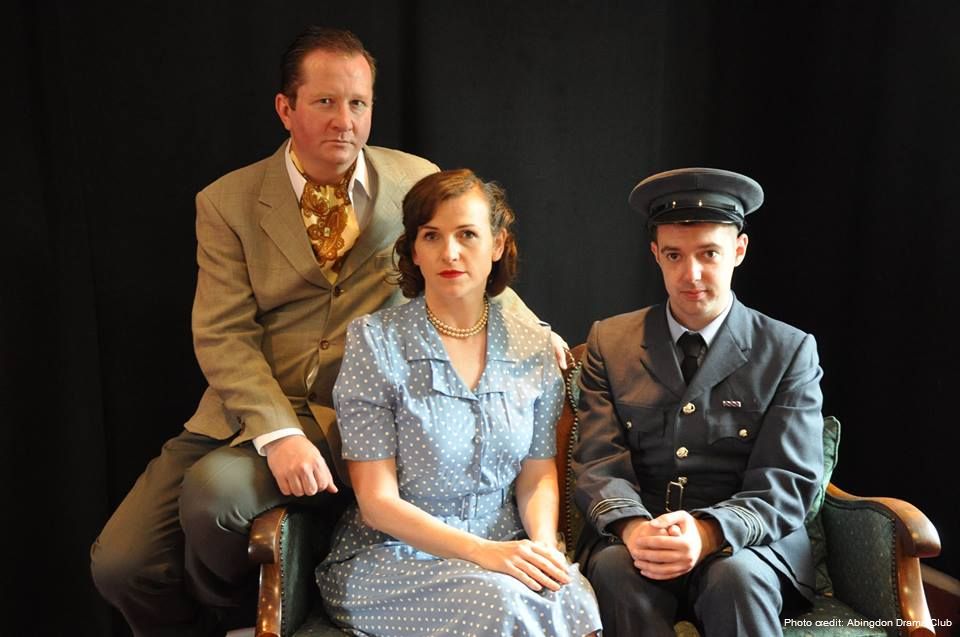|
FLARE PATH by Terence Rattigan Abingdon Drama Club Unicorn Theatre, Checker Walk, Abingdon, OX14 3HZ 4-7 July 2018 Wartime usually produces a heightened loyalty to one's country. Ironically though, it often ends up undermining other loyalties in the process. Loyalty to one's spouse is one such. Terence Rattigan's superbly crafted World War II drama, written in 1942, examines the fragile, changing affections of actress Patricia Warren (Laura King) towards her new husband Flight Lieutenant Teddy Graham (Dave Cassar) and her lover screen star Peter Kyle (John Hawkins). Pat has hastily married Teddy on the rebound from the suave but already-married Kyle, but almost instantly regrets it. When Kyle arrives at a hotel near Teddy's aerodrome, now divorced, Pat seems on the verge of leaving her new husband and running off with the film star. Yet Kyle's attitude towards love is tainted with a selfish neediness and he sees his intended marriage to Pat as something with which to fix his life. His acting career as a romantic lead is waning (he has turned 40) and he needs Pat to shore up his ego. Pat is willing to go along with the plan and escape her boring, young and naïve husband who displays a stiff upper lip and refuses to open up to his new wife. By contrast the emotional and passionate Peter Kyle seems like the antidote. But the war comes to the rescue, so to speak. Teddy and his crew go on a particularly risky bombing mission and he pilots the plane back to its Lincolnshire base with its tail shot to pieces, having barely escaped with his crew's lives. Teddy's emotional breakdown hours after his return reveals a new side to him that Pat has never glimpsed before. Her husband is no longer the baby-faced boy that she married, but a man with a courage that he does not even fully appreciate himself. He is the polar opposite to Kyle's self-obsessed luvvie. In his vulnerability he has revealed a bravery and nobility that wins Pat's heart, and she chooses to stay with him and reject Kyle.
Rattigan has given us a wonderful study of how war affects people – airmen, their wives and lovers, and those around them. The three principal players (John Hawkins, Laura King and Dave Cassar) gave us some beautifully judged performances that expressed the inner conflict of their characters as part of a wider military one. A touching sub-plot involved the relationship of local girl Doris (Maria Crocker) who had married Count Skriczevinsky (Zoltan Kollo), a pilot serving with the Free Polish Air Force. Pat and Kyle view the marriage as a case of a naïve girl being cynically deceived by a serviceman away from his home, and predict Doris' being cast off at the end of the war. But their cynicism is proved wrong and the warmth and affection between Doris and the Count proved one of the most touching strands in the play. Tony Green gave us a down-to-earth version of Sergeant 'Dusty' Miller, Teddy's trigger-happy rear gunner (willing to shoot at trains when there aren't any German planes around). Dusty's relationship with his wife Maudie (Louise King) is functional and matter of fact. They argue and worry and grumble. They are free from the romantic pretensions of Kyle and Pat and the actual romance of Doris and the Count. Their relationship has acquired that transactional character of many mid-life marriages, with love still visible if you dig deep enough. These were both believable performances by the actors that avoided drifting into cliché. Away from the couples I enjoyed the supporting roles presented to us by Terry Atkinson as Percy, the young barman who is still slightly more excited about the specifications of the different bombers on the local aerodrome than the human tragedies unfolding over the skies of Germany, and by the ever-dependable Jon Crowley as Squadron Leader Swanson. The play uses a single set, which was well designed and allowed subdivision of the stage area, albeit being a single room. One howler, that I cannot let pass, however, was the use of highlighter fluorescent yellow and pink cushions on the sofa in the residents' lounge. In 1942? Come on now. Lin Crowley presented us with a production that showcased Rattigan's wartime morale booster instead as a deeper study of how war affects people and their relationships. In different hands, perhaps, this could have been played more for laughs, particularly with some of the secondary characters. Thankfully, directorial restraint was the order of the day, and we got something better: a 70-year-old drama that scrubbed up as fresh and relevant now, as when first performed. Photo credit: Abingdon Drama Club
0 Comments
Leave a Reply. |
About the Author
Mike Lord has been involved with amateur theatre for over twenty years, mainly as an actor but also, more recently, as a director. Archives
July 2019
Contact me
Please use the Contact Form for anything apart from comments on blog posts. |



 RSS Feed
RSS Feed
